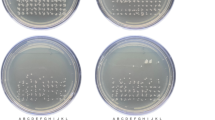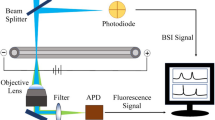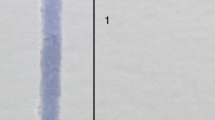Abstract
IN recent studies on the paper electrophoresis of carbohydrate compounds, we have found that replacing the cellulose filter paper by paper made from glass fibres1 greatly facilitates the identification of sugars and their derivatives, especially those which are difficult or impossible to detect on cellulose paper.
This is a preview of subscription content, access via your institution
Access options
Subscribe to this journal
Receive 51 print issues and online access
$199.00 per year
only $3.90 per issue
Buy this article
- Purchase on Springer Link
- Instant access to full article PDF
Prices may be subject to local taxes which are calculated during checkout
Similar content being viewed by others
References
O'Leary, M. J., Hobbs, R. B., Missimer, J. K., and Erving, J. J., Tappi, 37, 446 (1954).
Briggs, D. R., Garner, E. F., Montgomery, R., and Smith, F., Anal. Chem. (in the press).
Cf. Kunkel, H. G., “Methods of Biochemical Analysis”, Ed. D. Glick, p. 141, Interscience, New York (1954); Lederer, M., “Introduction to Paper Electrophoresis and Related Methods”, Elsevier Publishing Co., New York (1955).
Author information
Authors and Affiliations
Rights and permissions
About this article
Cite this article
BRIGGS, D., GARNER, E. & SMITH, F. Separation of Carbohydrates by Electrophoresis on Glass Filter Paper. Nature 178, 154–155 (1956). https://doi.org/10.1038/178154b0
Issue Date:
DOI: https://doi.org/10.1038/178154b0
This article is cited by
-
PVC-Papier als Tr�germaterial bei der Elektrophorese
Die Naturwissenschaften (1956)
Comments
By submitting a comment you agree to abide by our Terms and Community Guidelines. If you find something abusive or that does not comply with our terms or guidelines please flag it as inappropriate.



